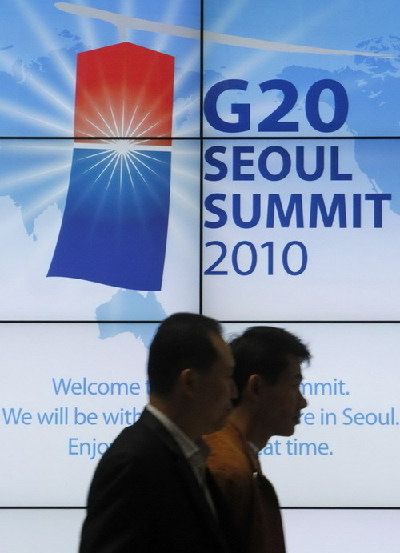Global General
Seoul: G20 leaders need 'concrete agreements'
(Agencies)
Updated: 2010-11-04 17:07
 |
Large Medium Small |
|
 Pedestrians walk past a signboard advertising the upcoming G20 Seoul Summit at the venue for the summit in Seoul November 4, 2010.[Photo/Agencies] |
SEOUL, South Korea -- Group of 20 leaders know they must achieve "concrete agreements" including goals for reducing current account and trade gaps at next week's summit or risk having their leadership of the world economy called into question, South Korea's president said Wednesday.
Finance ministers and central bank governors from the group of leading rich and developing nations met last month in South Korea ahead of the summit scheduled for November 11-12. They vowed to avoid using their currencies as trade weapons and promised to come up with a way to measure the reduction of destabilizing trade gaps.
The G20 includes wealthy nations such as the US Japan and Germany and developing countries including China, Brazil and India. It has taken over leadership of the world economy since the 2008 financial crisis led developing nations to demand more of a say. The forum accounts for about 85 percent of the global economy.
How they perform "directly relates to the legitimacy and the effectiveness" of the group, he said.
"Because if the G20 is unable to deliver on its promises, then many people, especially the skeptics, will question the viability and the legitimacy of the G20."
At the finance meeting last month, US Treasury Secretary Timothy Geithner had pushed in a letter for a commitment to polices that would reduce current account and trade imbalances "below a specified share" of gross domestic product "over the next few years."
Ultimately, the G20 agreed that such imbalances would be "assessed against indicative guidelines to be agreed," reflecting the opposition of some export-reliant countries such as Japan.
Lee was optimistic that G20 leaders, who include US President Barack Obama, German Chancellor Angela Merkel and Chinese President Hu Jintao, can make progress on the issue of targets.
"Especially, I look forward to the leaders agreeing to an indicative guideline that will address the global imbalance," he said, though provided no details.
The summit in Seoul will be the G20's fifth since its first in Washington in late 2008 was called to discuss how to deal with the global financial crisis and ensuing economic downturn. The group was established in 1999 and had held regular meetings of finance ministers and central bank governors.
The G20 aims to reduce protectionism and reform the global economy through measures such as increased financial regulation to make it less prone to suffering the kind of crisis that occurred in September 2008 when the collapse of US investment bank Lehman Brothers Holdings led to the worst economic downturn in decades.




